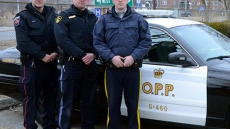TORONTO — The consternation surrounding an Ontario zoo's decision to kill a lion that escaped from its enclosure on the weekend is raising questions on two fronts — regulations surrounding wild animals, and the purpose of keeping such creatures captive in the first place.
Some advocates say the incident shines a spotlight on Ontario's longtime failure to protect both the animals and the public, citing decades worth of minimal regulations surrounding the zoos and private properties where wild animals live.
The very fact that such properties exist is part of the problem, according to at least one animal rights lawyer.
Camille Labchuk, executive director of Animal Justice Canada, said only two types of creatures are banned in the province — orcas and pitbulls. Beyond that, she said, the province's animal welfare rules are negligible.
"You are perfectly welcome to keep a tiger or a lion or an elephant in your backyard so long as the municipality you live in doesn't have any contrary rules," Labchuk said.
"Ontario has no problem with people keeping any kind of wild animal except for an orca or a pitbull in their private home...or their private zoo."
Labchuk said the lax approach extends to public zoos, including the Papanack Zoo near Ottawa where the lion died on Sunday.
According to a statement from owner Kerri Bayford, a male lion breached the fence surrounding his enclosure. The zoo was closed to the public when the lion got free, but Bayford said that staff decided to euthanize the lion within minutes of his escape.
"Our staff, with police present, made the decision to euthanize the lion on our property," the statement said. "The risk to the public of trying to sedate the lion was simply too high, as the sedative takes too long too kick in and this would have put everyone at risk."
Bayford did not respond to multiple requests for more detailed comment, but did indicate in the statement that the incident appeared to be the result of human error.
Labchuk said it's impossible to say to what degree Ontario's Wild West approach to animal welfare regulations could have prevented the incident at Papanack, but said the escape raises questions about the rules governing the province's zoos.
She said Ontario is the only Canadian province that allows zoos to operate without some kind of provincial licence, adding there are no rules forcing zoos to be listed on a provincial registry or subjected to randomized inspections.
The Ontario Society for the Protection of Animals has established a voluntary registry for the province's zoos. Senior inspector Jennifer Bluhm said 52 of the 69 zoos known to the society are currently listed on the registry, including Papanack.
Bluhm said the OSPCA does conduct inspections twice a year, at least one of which would take place unannounced.
Papanack was subjected to such an inspection just last month, she said, adding no animal welfare concerns were identified at that time. Public safety concerns do not fall within the society's mandate, she added.
The OSPCA act stands as the only law governing the keeping of animals in Ontario, Labchuk said, adding the rules lay out fairly general care and shelter standards.
Describing such standards as "minimal," Labchuk said they are not specific to zoos and apply equally to both public and private properties that house exotic animals.
The Ministry of Community Safety and Correctional Services, which is responsible for animal welfare concerns, views the OSPCA standards differently.
Describing them as "robust," spokesman Jonathan Rose said the government funds the society to the tune of $5.5 million a year to ensure the safety of animals.
"Our government will continue to work with all our animal welfare partners to ensure that we build even stronger protections and keep all animals safe," he said in a statement.
Some animal rights activists are hoping the incident at Papanack will raise public awareness about what they see as an inherently dangerous practice — allowing zoos to exist in the first place.
Michele Thorn of Ottawa is organizing a protest to take place near the zoo on Sunday afternoon.
She said the lion's death highlights the risk that zoos pose to the animals on display there, adding the animal died as a direct result of living in an unnatural environment that required him to be enclosed.
Even domestic animals are at risk from a business model that focuses on the bottom line before animal welfare, she said.
"(Zoos) are not there for the animals' sake," Thorn said. "If they were, they wouldn't breed in captivity, they wouldn't take wild animals, they wouldn't keep animals in unnatural enclosures."




